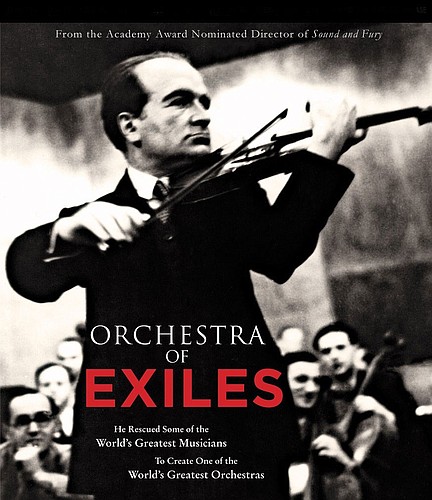- April 27, 2024
-
-
Loading

Loading

Josh Aronson, the director, producer and screenwriter of “Orchestra of Exiles” came March 17 to Sarasota to speak at the opening night screening of his film, in conjunction with the Jewish Federation of Sarasota-Manatee’s Israel Film Festival.
The film focuses on the story of Bronislaw Huberman, the Polish violinist responsible for bringing an orchestra to Palestine, which would eventually become the Israel Philharmonic. In the process, he saved thousands of lives of musicians from Nazi Germany.
Huberman’s story is told through re-enactments, archival material and interviews with guests such as Izhak Perlman.
Describe your experience at the Sarasota premiere of your film Sunday.
It was remarkable that it was completely sold out, because the American Jewish Committee gala dinner was at the same time.
I found that since the film has been playing at Jewish film festivals and at universities across the country, that the momentum is building for the documentary. It’s a mystery for me how the word gets out around the country. But word is getting out in the Jewish community about this important story that has never been told before.
(Last night) a woman came to me and said, “My father lived in Nazi-occupied Europe and could have left before the war but chose to stay behind. He died in the Holocaust, and I’ve never been able to forgive him for that. And your film shows me that it’s understandable.” Well, what a gift to me to tell me that my film actually resolved that conflict she’s lived with for so many years of her life ... It gives the perspective of why the issue was not so cut-and-dry.
Your documentaries typically cover a range of subjects. What inspires you; what makes you want to focus on particular topics?
When I find an idea, or a character or situation that might make a good film, I kind of brew, and it marinates. I read and do as much research as I can and find out as much as I can. And over a course of a few months, I feel I’m getting deeper into it or more engaged or impacted by it or I’m not … If it doesn’t grab me deeply and hold onto my interests, (then I won’t pursue it).
What first made you interested in the topic of the Israel Philharmonic?
Dorit Strauss is an amateur pianist like I am, and we share a piano teacher in New York City, and she came to me and said all her family and her were here because of one man, and that no one knew of him, and his name was Huberman. He was her father’s violin teacher in Vienna and brought him to Palestine, and she was going to go on all efforts to get the idea out there and pitched the idea to me.
What’s the most difficult part about presenting a historic story without being able to speak with those involved?
In this case, the hardest part for me was getting the essential script. All the primary research was in German and Polish, and I don’t speak either of those languages. So, to find the information I needed, I had to go to archives in Tel Aviv, (Israel), Berlin and Warsaw (Poland) to find the letters and find the people to translate the letters ... I had about 1,000 documents translated, from which I had to cull a script.
How did you hope to present Huberman?
As a human, as a man who had real difficulties, real personality issues because of his childhood — he was abused. His father took him away from any family life and put him on the road and gave him no education other than music. This was a person who was challenged and had an astounding gift for music … He was a real flawed person but he had this mission, the mission of his life, so he was a human being with flaws but he was a hero — he stood up against intolerance as much as anyone in history … I certainly want to show him as a hero, but also as a human.
What does this film speak to about our current society?
Along the same lines, I’m hopeful the film will be a very enduring educational tool that will be shown in educational settings as an inspiration for students and for children to see men (like those featured in my film) standing up against intolerance, against Nazis, fascism and racism … and that it can be emulated and admired.
**
Another screening of the film takes place at 7 p.m. Wednesday, March 20, at Temple Beth Israel, 567 Bay Isles Road, Longboat Key. Tickets are $7. Visit jfedsrq.org/filmfestival.aspx for more information. To learn more about the film visit OrchestraofExiles.com.